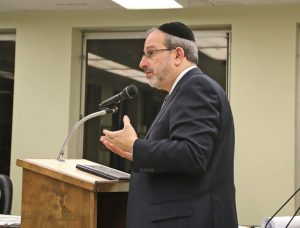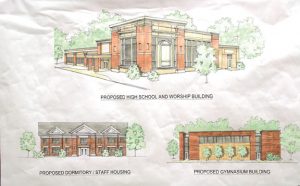
NAUGATUCK — The second round of the public hearing on a proposed private high school on May Street brought further details on the project and more questions from residents.
Yeshivas Ohr HaChaim, a Waterbury-based Jewish community, is seeking to build an all-boys Jewish high school along with housing on a 56-acre parcel at 874 May St. The plans include two dorms, a gymnasium and 86 housing units that will be a combination of two-family townhouses and single-family homes. The school will be associated with the New York City-based Touro College and University System.
The project requires changing the zone of the land from residential to a planned design district, which would allow the school and housing to be built on the same parcel. The Zoning Commission continued its hearing on the proposal on Feb. 15.
Rabbi Moshe Krupka, executive vice president of Touro College and University System, said Touro College was originally founded so that people would not have to choose between a quality education and a place that respected their religious beliefs. The new high school is founded on the same belief, Krupka said.
“We don’t want any student, whether they are of the Jewish faith or any other faith, to have to choose between their religious observance and their education,” Krupka said.
Krupka said Jewish families in Connecticut currently choose between sending their children to a school that doesn’t focus on Judaic studies or to a private school up to five hours away.
According to Krupka, the school will accept up to 100 students, with 50 living in the dorms.
Zoning Commission Chairman William Stopper questioned whether the school would expand if it finds a need for more than 100 students.
Krupka said the school would likely maintain 100 students.
“We are maintaining the 100 number because we know the impact appropriate student-faculty ratio has on the quality of education,” Krupka said.
The proposal elicited a wide range of concerns from residents
Linda Gulotta was concerned about what the future of the borough would look like if the commission approved the plan.
“This is a residential area and you are talking about rezoning it for a community that is essentially a city on the hill. You are taking a large amount of houses, a school, a gymnasium, a pool and putting it all on 54 acres. That’s a city,” Gulotta said.
Gulotta also questioned what the project would add to the borough.
“We have no community centers for Jewish people in this town. We have no Jewish restaurants. We have no kosher food. We have no kosher stores. So how is this community contributing to our community when they are separating themselves from our town, being up on a hill, and not coming into our town to do things? There are many exits off of Route 8 to get up there without coming through our town. Other than the tax base you are going to get from the houses, because the school is exempt from it, what are they contributing to our community,” Gulotta said.

While the project would increase the borough’s tax rolls, Krupka said he was unsure how to quantify the value of people living in a place.
“I don’t know how to answer the question of value and how to put value on human existence or human interaction,” Krupka said. “I don’t know how you put a value on someone opening a store in your town or opening an office practice of law, of medicine, or the businesses that will be generated by these individuals living in your community side by side with you, interacting with you, providing goods and services, and opportunities for neighborly friendship. I don’t know what the value of seeing parents play with their children in the park. But I assume it will bring a smile to people’s faces.”
Krupka also addressed the project being called a “city on the hill.”
“[That phrase] was first intoned and wrote down in Matthew because Jesus used it. It connotes a community that’s built on virtue, built on integrity, politeness, courtesy, friendship, and, most importantly, people of good faith. And that’s what we intend to create,” Krupka said.
Diana Raczkowski, whose property borders the proposed development site, raised concerns about the potential effect the project might have on the water levels in the surrounding area. She asked the commission to require that all wells within 500 feet of the project be tested for flow quality and quantity and water quality prior to any clearing of the land.
“Clearing of the land reduces the water table. There are some older homes, like the one next to me, with only an 80-foot well. We need a baseline to establish in case there is a problem,” Raczkowski said.
Brian Baker, director of engineering for Civil 1, said the borough’s regulations state that wells should be tested if there is any blasting done and the company will follow the regulations if it does any blasting.
Resident Clista Michalek said she was worried about the amount of traffic the project would generate.
“It’s not about the school. It’s not about the development itself. It’s about the size of it and the scope of it, which completely alters the neighborhood,” Michalek said. “If you are looking at two cars per resident you are looking at least 162 more vehicles on that road.”
The hearing was continued to the commission’s meeting in March.













